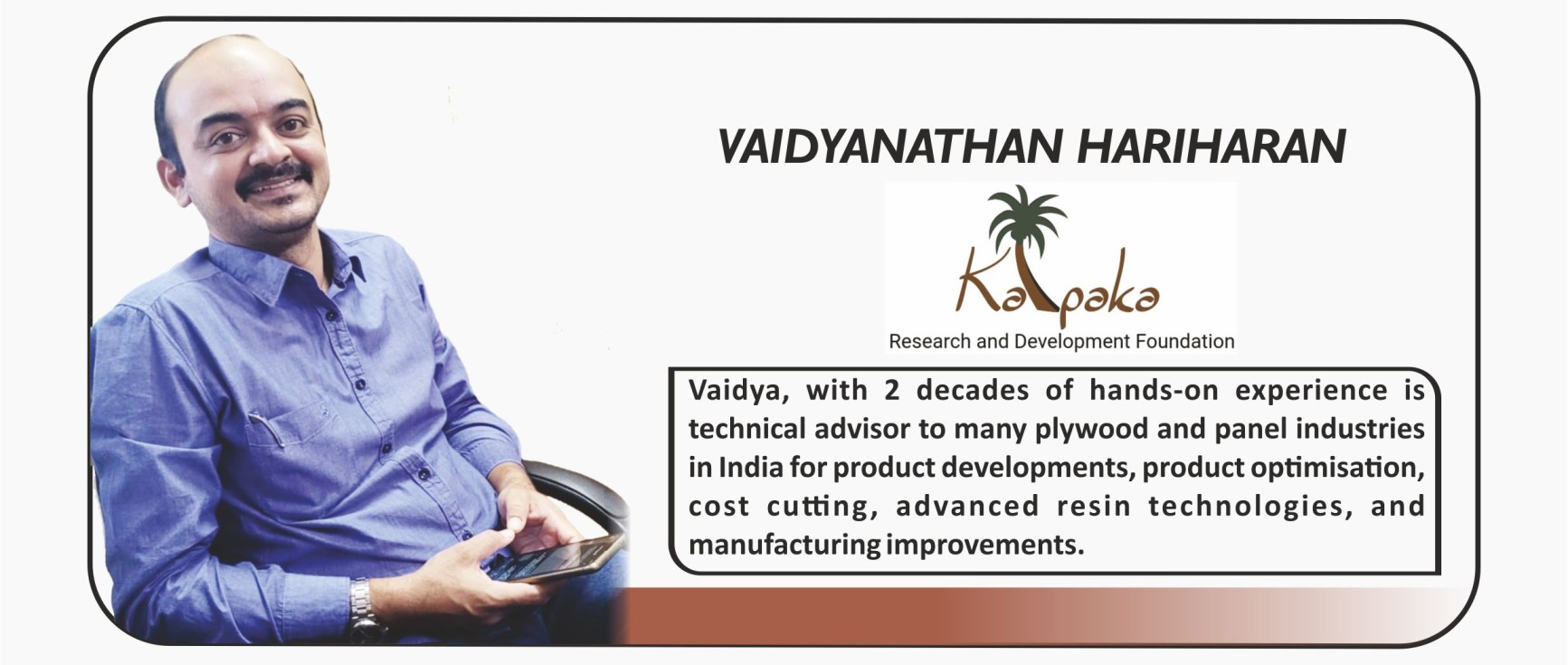
Siraj Asger Ali – Mufaddel Timber & Allied
- February 11, 2023
- 0
Organized and regulated Factories are
currently experiencing more difficulties
Rubber is available to industries only when it is replanted. These days, farmers are a little discouraged on rubber plantations.
How is the market?
The plywood industry is in plight nowadays, not only in northern India but also in southern states such as Karnataka. The industry has two major issues. First of all, the availability of raw materials is constantly reducing. The second problem is the increased supply of sub-standard products in the market. Due to this, organized and regulated units are at a risk.
What is the problem with the supply of raw materials?
Raw materials for plywood include Silver Oak, Eucalyptus, Milia Dubia, and Rubber. Milia Dubia is available as of now. But its plantation is not sufficient enough to fulfil the requirements of the coming times. Rubber is available to industries only when it is replanted. These days, farmers are a little discouraged on rubber plantations. As a result, its availability is also decreasing.
The same goes for Silver Oak. Which don’t have plantation. Instead, it is grown for shade in cofee gardens. The plantation of Eucalyptus is also decreasing. Milia is coming from the border areas as of now. That’s why, it is a matter of concern for the future. The scarcity of raw materials is starting to show up Right now. Rates are also increasing. The cost of timber for peeling at the factory gate has reached almost Rs. 10,000 to Rs. 12,000.
Why is the problem? How can it be resolved?
The primary reason is the government’s irresponsible policy on licensing of timber-based units. This has created a huge gap between demand and supply, on and above the unavailability of raw materials. New units are coming up rapidly in Karnataka after the 2002 order. Official papers are reflecting only 5-6 units. But in actuality, there are 25-30 units out of which most of the units are for peeling and pressing. Obviously, the demand for raw materials has increased. For this purpose, small trees are also harvesting.
Now the government has started licensing new units. The association has been in discussions with the government about this, explaining the great risk for shortages of raw materials in the future due to the granting of new licenses. Another major problem in Karnataka is that timber can move out of the state without any hindrance, but does not come freely from neighboring states. We are putting a lot of effort at our end, such as contract farming, to ensure the regular availability of timber.
How does the opening of new units adversely affect the market?
New entrepreneurs in the industry have negligible or superficial knowledge about the production process and quality of the product. For this reason, the new and unregulated units neither care about quality nor about delivering durable goods to the consumers. The industry is being handed down to some of the unscrupulous carpenters who consume low-quality goods in the market for the sake of some extra bucks.
Production cost decreases when one compromises with the quality of the goods. Hence, profits can be earned even by selling them at reduced costs in the market. Of course, good quality products will be expensive. Thus, it’s becoming more and more difficult to sell them. On the one hand, manufacturers who manufacture good quality products and follow the regulations are facing problems, and on the other hand, customers are not getting high-quality products. This way, both of them lose.
What measures are being taken to survive in the market?
We have focussed our selves to the local market. The logistic cost of the products increases if they are sold outside the borders. We had to cut down the production by 50% approximately. For this reason, too, we cannot work like a brand because if we need to strengthen our market presence as a brand, then we will have to increase production as well. Such a strategy does not work on low production.
संगठित और नियमों पर चलने वाली फैक्टरी
इस वक्त और दुविधा संकट में हैं
रबर में रि-प्लांटेसन के तहत जब पुराने पेड़ काट कर नए पेड़ लगाए जाते हैं। तभी उद्योगों के लिए उपलब्ध होते हैं। आजकल रबड़ की रि-प्लांटेसन में किसान कुछ निरूत्साहित हैं।
बाजार कैसा है?
उत्तर भारत में ही नहीं बल्कि कर्नाटक जैसे दक्षिण राज्यों में भी इन दिनों प्लाइवुड इंडस्ट्री संकट के दौर में हैं। इंडस्ट्री को दो बड़ी समस्या सामने आ रही है। पहली तो कच्चे माल की उपलब्धता लगातार कम हो रही है। दूसरी समस्या यह है कि कम गुणवत्ता का माल जो बाजार में तेजी से उतारा जा रहा है। इससे ऑर्गनाइज यूनिट के सामने संकट पैदा हो रहा है।
कच्चे माल की उपलब्धता में क्या दिक्कत आ रही है ?
प्लाईवुड के लिए जिस राॅ मैटेरियल का हम प्रयोग करते हैं, इसमें सिल्वर ओक, युकेलिप्टिस, मिलिया दुबिया और रबर है। अभी मिलिया दुबिया मिल रहा है। लेकिन आगे मीलिया दुबिया का उस रफ्तार से पौधारोपण नहीं हो रहा हैं, कि भविष्य में पर्याप्त मात्रा में उपलब्ध होता रहे। रबर में रि-प्लांटेसन के तहत जब पुराने पेड़ काट कर नए पेड़ लगाए जाते हैं। तभी उद्योगों के लिए उपलब्ध होते हैं। आजकल रबड़ की रि-प्लांटेसन में किसान कुछ निरूत्साहित हैं। इसलिए इसकी मात्रा भी कम हो रही है। सिल्वर ओक के साथ भी वही समस्या है। इसकी प्लांटेशन नहीं हैं। बल्कि इसे काफी बागानों में छाया के लिए लगाया जाता है।
यूकेलिप्टस का प्लांटेशन भी कम हो रहा है। सीमावर्ती क्षेत्रों से मिलिया अभी तो आ रहा है। फिर भी भविष्य को लेकर चिंता पैदा हो रही है। अभी से कच्चे माल की कमी महसूस होनी शुरू हो गई है। रेट भी बढ़ रहे हैं। पीलिंग के लिए जो लकड़ी आती है, उसकी किमत फैक्ट्री गेट तक पहुंचने में दस से बाहर हजार रूपये प्रति टन तक पहुंच गई है।
इस समस्या की वजह क्या है, कैसे इससे निपटा जा सकता है?
बड़ी वजह तो लकड़ी आधारित यूनिट के लाइसेंस को लेकर सरकार की गैर जिम्मेदाराना नीति है। जिससे कच्चे माल की उपलब्धता के साथ साथ, मांग और सप्लाई के बीच बड़ा अंतर पैदा कर दिया है। कर्नाटक में 2002 के ऑर्डर के बाद तेजी से नयी यूनिट खुल रही है। कागजों में जहां पांच से छह यूनिट है, लेकिन वास्तव में चल रही है 25 से 30 यूनिट। इसमें ज्यादातर पीलिंग यूनिट और प्रेस लगी है। जाहिर है, कच्चे माल की मांग बढ़ेगी। इसे पूरा करने के लिए छोटे पेड़ भी काटे जा रहे हैं।
अब तो सरकार ने लाइसेंस खोल ही दिए हैं। इसे लेकर एसोसिएशन ने सरकार से बातचीत की, उन्हें समझाया कि लाइसेंस खुलने से भविष्य में कच्चे माल की भारी दिक्कत आ सकती है। कर्नाटक में दूसरी बड़ी दिक्कत यह भी है कि लकड़ी राज्य से बाहर बेरोक टोक जा सकती है। लेकिन आस पास के राज्यों से यहां लकड़ी नहीं आती। लकड़ी पर्याप्त मिलती रहे, इसके लिए हम अपने स्तर पर कई प्रयास कर रहे हैं, जैसें कांट्रेक्ट फार्मिंग।
ज्यादा यूनिट खुलने से बाजार पर क्या प्रतिकूल असर पड़ता है?
जो नये उद्यमी इस उद्योग में आ रहें हैं उन्हें उत्पादन प्रक्रिया और गुणवत्ता के बारे में बहुत कम या सतही ज्ञान हैं। इस वजह से जो नयी और गैर संगठित यूनिट है, वो न तो क्वालिटी का ध्यान रखते हैं, न ही इस बात का ध्यान रखते हैं कि टिकाऊ माल उपभोक्ताओं को उपलब्ध कराया जाए। हो यह रहा है कि कुछ बेइमान कारपेंटर के हाथ में इंडस्ट्री जा रही है। जो कुछ अतिरिक्त फायदे के लिए कम गुणवत्ता के माल को बाजार में खपा देते हैं। गुणवत्ता से समझौता करने के बाद उत्पादन लागत कम हो जाती है।
इस वजह से बाजार में इसे सस्ते दाम पर बेच कर भी मुनाफा कमाया जा सकता है। अब जो अच्छा माल होगा, जाहिर है वह महंगा होगा। उसे बेचना मुश्किल होता जा रहा है। इसमें जहां अच्छा माल तैयार करने वालों और नियम कानून मानने वाले उत्पादकों के सामने दिक्कत है, वहीं ग्राहक को भी उच्च गुणवत्ता का माल नहीं मिल पा रहा है। इस तरह से दोनों ही नुकसान में जा रहे हैं।
बाजार में बने रहने के लिए फिर क्या कदम उठाए जा रहे हैं?
हम स्थानीय मार्केट पर ही ध्यान दे रहे हैं। यदि बाहर माल भेजते हैं तो भेजने की लागत महंगी हो जाती है। इस तरह से माल की लागत बढ़ जाती है। अभी उत्पादन भी 50 प्रतिशत तक कम करना पड़ा है। इस वजह से भी ब्रांड की तरह काम नहीं कर सकते। क्योंकि ब्रांड की तरह बाजार में मजबूती से अपनी उपस्थिती बनानी होगी, तब उत्पादन भी बढ़ाना होगा। कम उत्पादन पर इस तरह की रणनीति कारगर नहीं होती।
































































